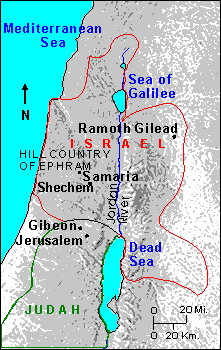KEY PLACES IN 2 CHRONICLES
 0. Key Places In 2 Chronicles
0. Key Places In 2 Chronicles1. Gibeon
a) David's son Solomon became king over Israel. He summoned the nation's leaders to a ceremony in Gibeon. Here God told Solomon to ask for whatever he desired. Solomon asked for wisdom and knowledge to rule Israel (2 Chronicles 1:1-12).
2. Jerusalem
a) After the ceremony in Gibeon, Solomon returned to the capital city, Jerusalem. His reign began a golden age for Israel. Solomon implemented the plans for the temple which had been drawn up by his father, David. It was a magnificent construction. It symbolized Solomon's wealth and wisdom, which became known worldwide (2 Chronicles 1:13-9:31).
3. Shechem
a) After Solomon's death, his son Rehoboam was ready to be crowned in Shechem. However, his promise of higher taxes and harder work for the people led to rebellion. Everyone but the tribes of Judah and Benjamin deserted Rehoboam and set up their own kingdom to the north called Israel. Rehoboam returned to Jerusalem as ruler over the southern kingdom called Judah (2 Chronicles 10:1-12:16). The remainder of 2 Chronicles records the history of Judah.
4. Hill Country of Ephraim
a) Abijah became the next king of Judah, and soon war broke out between Israel and Judah. When the armies of the two nations arrived for battle in the hill country of Ephraim, Israel had twice as many troops as Judah. It looked like Judah's defeat was certain. But they cried out to God, and God gave them victory over Israel. In their history as separate nations, Judah had a few godly kings who instituted reforms and brought the people back to God. Israel, however, had a succession of only evil kings (2 Chronicles 13:1-22).
5. Aram
a) Asa, a godly king, removed every trace of pagan worship from Judah and renewed the people's covenant with God in Jerusalem. But King Baasha of Israel built a fortress to control traffic into Judah. Instead of looking to God for guidance, Asa took the silver and gold from the temple and sent it to the king of Aram requesting his help against King Baasha. As a result, God became angry with Judah (2 Chronicles 14:1-16:14).
6. Samaria
a) Although Jehoshaphat was a godly king, he allied himself with Israel's most evil king, Ahab. Ahab's capital was in Samaria. Ahab wanted help fighting against Ramoth Gilead. Jehoshaphat wanted advice, but rather than listening to God's prophet who had promised defeat, he joined Ahab in battle (2 Chronicles 17:1-18:27).
7. Ramoth Gilead
a) The alliance with Israel against Ramoth Gilead ended in defeat and Ahab's death. Although shaken by his defeat, Jehoshaphat returned to Jerusalem and to God. But his son Jehoram was a wicked king, as was his son Ahaziah, and history repeated itself. Ahaziah formed an alliance with Israel's King Joram to do battle with the Arameans at Ramoth Gilead. This lead to the death of both kings (2 Chronicles 18:28-22:9).
8. Jerusalem
a) The rest of Judah's history recorded in 2 Chronicles centers on Jerusalem. Some kings caused Judah to sin by bringing idol worship into their midst. Others cleaned up the idol worship, reopened and restored the temple and, in the case of Josiah, tried to follow God's laws as they were written by Moses. In spite of the few good influences, a series of evil kings sent Judah into a downward spiral that ended with the Babylonian empire overrunning the country. The temple was burned, the walls of the city were broken down, and the people were deported to Babylon.
Comments
Post a Comment